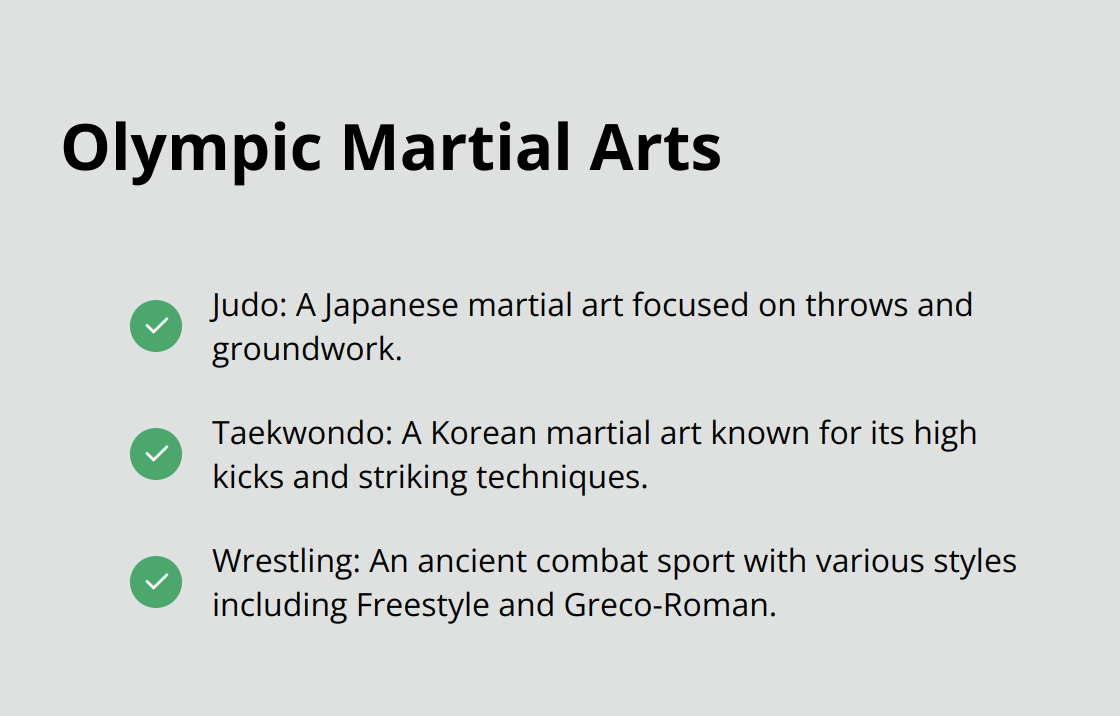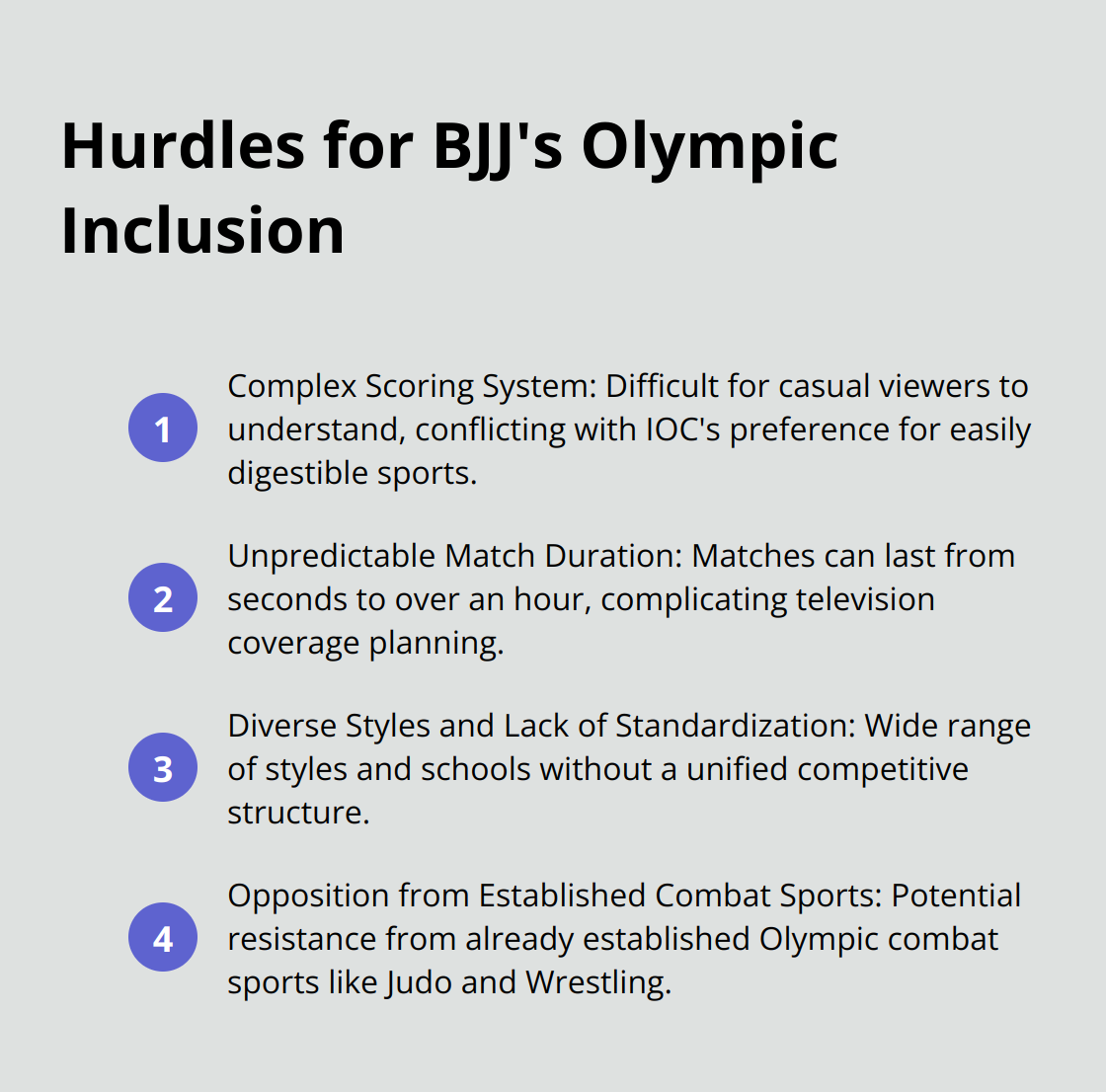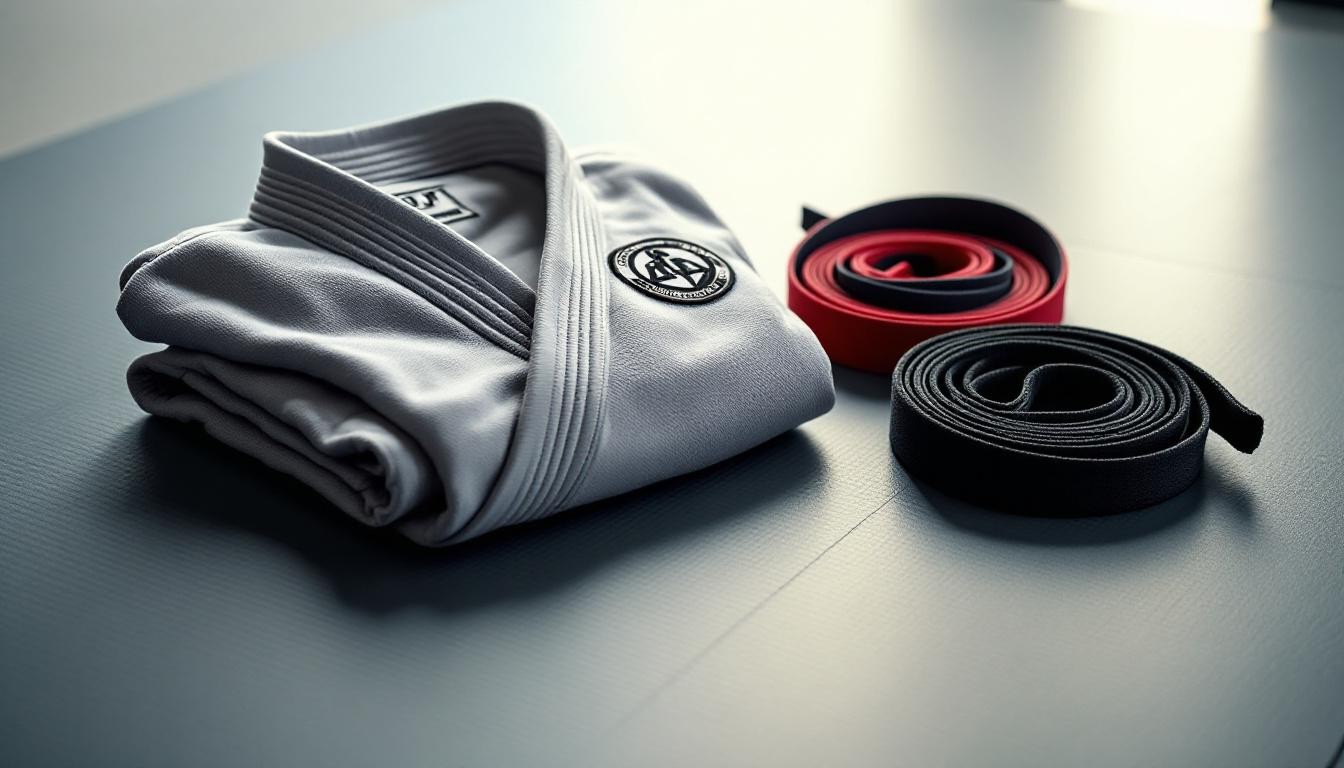At Jiu jitsu, we’re excited about the potential future of Brazilian Jiu-Jitsu in Olympic sports. The question “Is Jiu-Jitsu in the Olympics?” has been on the minds of practitioners and fans for years.
While BJJ isn’t currently an Olympic sport, recent developments have sparked renewed interest in its inclusion. This blog post explores the current status, potential benefits, and challenges facing BJJ’s journey to the Olympic stage.
Where Does BJJ Stand in Olympic Sports?
The Long Road to Recognition
Brazilian Jiu-Jitsu’s quest for Olympic recognition has not been a straightforward path. Despite its worldwide popularity surge, BJJ has yet to secure a spot in the Olympic Games. The sport’s origins date back to the early 20th century, but it only gained significant international attention in the 1990s.
Martial Arts in the Olympic Arena
Several martial arts currently feature in the Olympics, including Judo, Taekwondo, and Wrestling. These sports have established themselves with standardized rules, global governing bodies, and widespread participation. In contrast, BJJ faces challenges in these areas, which have impeded its Olympic aspirations.

Recent Developments and IOC Interactions
Recent years have witnessed increased efforts to bring BJJ to the Olympic stage. The International Brazilian Jiu-Jitsu Federation (IBJJF) actively engages with the International Olympic Committee (IOC) to promote the sport’s inclusion. However, progress remains slow due to several factors.
A major obstacle is the absence of a unified global governing body for BJJ. Unlike Judo, which has the International Judo Federation (IJF), BJJ has multiple organizations with varying rule sets. This fragmentation complicates the IOC’s consideration of BJJ as a cohesive sport.
Efforts Towards Standardization
To address this issue, some BJJ organizations work towards standardizing rules and regulations. The United Arab Emirates Jiu-Jitsu Federation (UAEJJF) has been particularly active in this regard, organizing international tournaments and pushing for a more unified approach to the sport.
The ADCC (Abu Dhabi Combat Club) Submission Wrestling World Championship, while not strictly a BJJ event, has gained significant prestige and could serve as a model for future Olympic-style competitions. Its ruleset, which emphasizes submissions and dynamic grappling, might appeal to a broader audience.
The Path Forward
As BJJ continues to evolve, the path to Olympic inclusion remains challenging but not impossible. The sport’s technical depth, strategic elements, and growing global appeal make it a strong candidate for future consideration. However, significant work remains in unifying the sport’s governance and adapting its format to meet Olympic standards.
At Souza Grappling Co., we offer expert training in our 3,000 sq. ft. facility, ensuring our students are prepared for any competitive format. Our trainers stay informed about the latest techniques and rule changes, reflecting the sport’s dynamic nature.
The next steps for BJJ’s Olympic journey will likely involve further standardization efforts and increased collaboration between different organizations. These developments will shape not only the sport’s Olympic prospects but also its overall growth and evolution in the coming years.
How Olympic Inclusion Would Benefit BJJ
Global Visibility and Participation Surge
Olympic inclusion would revolutionize Brazilian Jiu-Jitsu (BJJ) on a global scale. The sport’s visibility would skyrocket, attracting millions of new practitioners and fans worldwide. Some of the top athletes have not only excelled in competitions but have also played pivotal roles as “ambassadors,” promoting and spreading Jiu-Jitsu.
This surge in popularity would lead to significant financial investments in BJJ. Olympic sports typically receive substantial funding from national sports committees and private sponsors.
New Career Paths for Athletes
Olympic recognition would create new career paths for BJJ athletes. Currently, professional BJJ competitors often struggle to make a living solely from the sport. Olympic inclusion would open doors to government funding, sponsorships, and potentially lucrative endorsement deals.

Standardization of Rules and Regulations
One of the most significant benefits of Olympic inclusion would be the standardization of BJJ rules and regulations. Currently, different organizations have varying rulesets, which can confuse practitioners and spectators alike.
Advancements in Training and Techniques
Olympic status would likely accelerate the development of BJJ techniques and training methodologies. The influx of resources and attention would fuel research into optimal training practices, injury prevention, and performance enhancement.
As we consider these potential benefits, it’s important to also examine the challenges that BJJ must overcome to achieve Olympic status. The road to Olympic inclusion is not without its obstacles, and the next section will explore these hurdles in detail.
Hurdles on the Olympic Mat
Complex Scoring System
Brazilian Jiu-Jitsu (BJJ) faces significant challenges in its quest for Olympic recognition. Understanding the key differences between BJJ, wrestling, and judo is crucial. BJJ’s scoring system differs from judo or wrestling, making it challenging for casual viewers to understand. This complexity conflicts with the International Olympic Committee’s (IOC) preference for easily digestible sports for a global audience.
BJJ organizations are exploring simplified scoring methods to address this issue. The IBJJF has experimented with a points system that emphasizes more dynamic actions (such as takedowns and sweeps). However, striking a balance between maintaining the sport’s integrity and creating a viewer-friendly format remains a significant challenge.

Unpredictable Match Duration
Another hurdle for BJJ’s Olympic aspirations is the unpredictable duration of matches. Olympic sports typically have fixed time limits to fit into broadcasting schedules. BJJ matches can last anywhere from a few seconds to over an hour, which complicates television coverage planning.
Some tournaments have introduced time limits and sudden death overtime periods to mitigate this issue. The ADCC, for example, uses a system where matches have a set duration, followed by an overtime period if necessary. This format could serve as a template for potential Olympic matches.
Diverse Styles and Lack of Standardization
BJJ’s wide range of styles and schools presents another challenge. From traditional Gi to No-Gi, and from point-focused to submission-only formats, the sport lacks a unified competitive structure. The IOC typically requires a standardized ruleset for Olympic inclusion.
Efforts to create a more unified approach are underway. The United Arab Emirates Jiu-Jitsu Federation (UAEJJF) has worked towards standardizing rules across international competitions. However, resistance from traditional schools and concerns about losing the sport’s essence in the process of standardization remain significant obstacles.
Opposition from Established Combat Sports
BJJ also faces opposition from already established Olympic combat sports. Judo and wrestling, in particular, may view BJJ as a threat to their prominence and funding. These sports have strong lobbying power within the IOC and could potentially block BJJ’s inclusion.
To overcome this, BJJ needs to demonstrate its unique value proposition. The sport’s emphasis on ground fighting and submissions sets it apart from other grappling arts. Highlighting these distinctions and showcasing BJJ’s potential to attract new audiences to the Olympics could help sway opinion in its favor.
Final Thoughts
The question “Is Jiu-Jitsu in the Olympics?” remains unanswered, but BJJ’s potential impact on the Olympic stage is undeniable. BJJ’s technical depth, strategic elements, and growing global appeal make it a strong candidate for future consideration. The sport’s inclusion in the Olympics would elevate its status and bring a fresh dimension to the world’s most prestigious sporting event.
BJJ must establish a unified global governing body to achieve Olympic recognition. This organization would standardize rules, oversee international competitions, and represent BJJ’s interests to the International Olympic Committee. Efforts to simplify scoring systems and match durations must continue, balancing the sport’s integrity with viewer-friendly formats.
At Souza Grappling Co., we nurture the next generation of BJJ practitioners in our 3,000 sq. ft. facility. We offer expert training in Jiu-Jitsu, Muay Thai, and Self-Defense (preparing our students for various competitive formats). As BJJ progresses towards potential Olympic inclusion, we will adapt our training methods and support our athletes in their pursuit of excellence.




